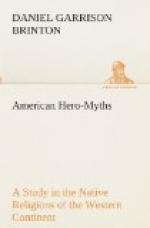[Footnote 1: Sahagun, Historia, Lib. ii, cap. xxxvii.]
Others have contended that Tezcatlipoca, as undoubtedly the spirit of darkness and the night, refers, in its meaning, to the moon, which hangs like a bright round mirror in the sky, though partly dulled by what the natives thought a smoke.[1]
[Footnote 1: Anales del Museo Nacional, Tom. ii, p. 257.]
I am inclined to believe, however, that the mirror referred to is that first and most familiar of all, the surface of water: and that the smoke is the mist which at night rises from lake and river, as actual smoke does in the still air.
As presiding over the darkness and the night, dreams and the phantoms of the gloom were supposed to be sent by Tezcatlipoca, and to him were sacred those animals which prowl about at night, as the skunk and the coyote.[1]
[Footnote 1: Sahagun, Historia. Lib. vi, caps. ix, xi, xii.]
Thus his names, his various attributes, his sacred animals and his myths unite in identifying this deity as a primitive personification of the Darkness, whether that of the storm or of the night.[1]
[Footnote 1: Senor Alfredo Chavero believes Tezcatlipoca to have been originally the moon, and there is little doubt at times this was one of his symbols, as the ruler of the darkness. M. Girard de Rialle, on the other hand, claims him as a solar deity. “Il est la personnification du soleil sous son aspect corrupteur et destructeur, ennemi des hommes et de la nature.” La Mythologie Comparee, p. 334 (Paris, 1878). A closer study of the original authorities would, I am sure, have led M. de Rialle to change this opinion. He is singularly far from the conclusion reached by M. Ternaux-Compans, who says: “Tezcatlipoca fut la personnification du bon principe.” Essai sur la Theogonie Mexicaine, p. 23 (Paris, 1840). Both opinions are equally incomplete. Dr. Schultz-Sellack considers him the “Wassergott,” and assigns him to the North, in his essay, Die Amerikanischen Goetter der Vier Weltgegenden, Zeitschrift fuer Ethnologie, Bd. xi, 1879. This approaches more closely to his true character.]
This is further shown by the beliefs current as to his occasional appearance on earth. This was always at night and in the gloom of the forest. The hunter would hear a sound like the crash of falling trees, which would be nothing else than the mighty breathings of the giant form of the god on his nocturnal rambles. Were the hunter timorous he would die outright on seeing the terrific presence of the god; but were he of undaunted heart, and should rush upon him and seize him around the waist, the god was helpless and would grant him anything he wished. “Ask what you please,” the captive deity would say, “and it is yours. Only fail not to release me before the sun rises. For I must leave before it appears."[1]
[Footnote 1: Torquemada, Monarquia Indiana, Lib. XIV, cap. XXII.]




